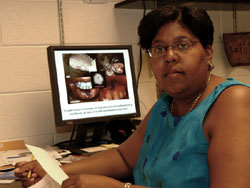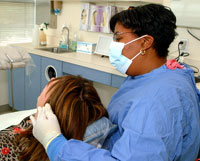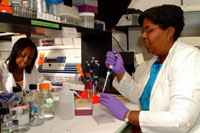 |
|
Meet a real Dentist, Jennifer Cyriaque
|
 |

|
|
Jennifer Webster-Cyriaque, D.D.S., Ph.D., Assistant Professor, Dental Ecology, School of Dentistry, University of North Carolina
|
1. I chose this career because...
2. My typical workday involves...
3. What I like best and least about my work is…
4. My career goals are…
5. When I’m not working, I like to…
6. Go for it!
|
|
1. I chose this career because...
|
Back to Top

|

|
|
Dr. Cyriaque examines a dental patient.
|
I chose to become a dentist because it was the career that best combined all my skills and interests. My interest in health science was evident since high school, when I wrote an essay about wanting to be a doctor. Then I read The Unkindest Cut: Life in the Backrooms of Medicine, by Marcia Millman, and decided to consider alternatives within the field. While an undergraduate, I explored one option by taking a 6-week course for students who wanted to pursue dentistry at the University of Maryland and by working as a dental assistant for a local dentist in Buffalo.
I thought dentistry would bring all my skills and interests together:
- Have good manual dexterity with hands (“I’m good with my hands.”)
- Am interested in science
- Like working with people
- Enjoy artistic expression
- Am inquisitive
I applied to the Dental School at the University of Buffalo in New York, and was accepted.
Education and Experience
- Undergraduate double major: Biology and Interdisciplinary Social Science, B.A. State University of New York at Buffalo
- Doctor of Dental Surgery (D.D.S.), Dental School, State University of New York at Buffalo
- Doctor of Philosophy (Ph.D.), Microbiology and Immunology, University of North Carolina at Chapel Hill
- Postdoctoral Fellowship, Pathogenesis of Infectious Disease, University of North Carolina at Chapel Hill
I became interested in research in undergraduate school, when I worked in microbiology and genetics labs. I also worked in dental research labs for two summers during dental school. My research interest prompted me to go one step further in my education. During dental school, I became fascinated with oral soft tissue diseases and wanted to understand their origin. I decided to pursue the dental scientist program at the University of North Carolina, Chapel Hill. My research focus areas are in microbiology and immunology. My clinical focus areas are in oral medicine and general practice (or hospital dentistry). My specialty is the study of oral diseases at the molecular level.
|
|
2. My typical workday involves...
|
Back to Top

|

|
|
Dr. Cyriaque working with one of her colleagues in her research laboratory.
|
My typical day is different depending on whether I’m in the clinic or the lab. I’m usually in the clinic 1 to 1.5 days a week. The rest of the week, I’m in the lab.
Clinical Days
- 7:45 to 10:00 a.m. – Work with residents reviewing cases and clinical rounds. This is when we review each patient’s progress and make decisions about their oral care and the dental work that they are going to receive.
- 1:00 to 2:00 p.m. – Attend oral biology seminars given by medical students and residents about their research.
- 2:00 to 5:00 p.m. – See patients for general dentistry in the dental faculty private practice.
Laboratory Days
During lab days, I may do any combination of the following:
- Read and review the scientific literature
- Meet with, supervise, and assist students, technical people, and postdoctoral fellows
- Perform my own experiments
- Analyze research data
- Write about and format my research results for publication or grant applications
- Attend meetings of laboratory personnel
- Attend seminars and campus-wide meeting of virologists
- Teach oral medicine or microbiology lectures to dental and graduate students
- Review research publications and grants submitted by other researchers
- Discuss science and research topics with colleagues
Equipment I use in the Laboratory
- Confocal microscope – Uses a laser and mirrors to scan multiple layers of fluorescent dye-labeled samples.
- Polymerase chain reaction (PCR) machine – Regulates cycles of time and temperature for enzymatic reactions that amplify DNA.
- Electrophoresis apparatus – Runs gels containing DNA, RNA, or protein.
- Microarray scanner – Helps with visualizing gene-expression experiments.
|
|
|
 |